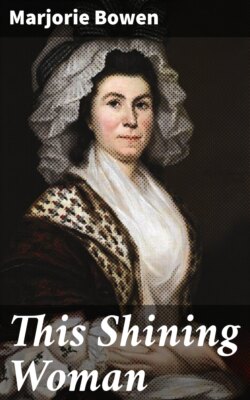Читать книгу This Shining Woman - Bowen Marjorie - Страница 9
На сайте Литреса книга снята с продажи.
* * *
ОглавлениеTable of Contents
To the astonishment of her mother and the admiration of her brothers and sisters, Mary protested against the move to Wales. Her expostulations provoked nothing but an outburst of senseless wrath from Edward Wollstonecraft and stern rebukes from her mother for endeavouring to question the paternal fiat.
Poignant farewells had to be taken of the Clares, the scholar's charming little room with the beloved books visited for the last time, a farewell letter written to Fanny Blood, and the poor goods and chattels were once more packed upon the stage-wagon and the family sent off on the long, tedious journey to Wales.
The neglected farm, Laugharne, of which Mr. Wollstonecraft took possession, proved to be as dismal a habitation as Mary had feared. Her father had taken no interest in his remote property, which he had never visited before and which necessity only had driven him to visit now. The district was poor, the scattered neighbours consisted of small farmers and peasantry, and Edward Wollstonecraft had no longer any capital to put into his random enterprise. His family lived as best they could from hand to mouth, Mary and her mother continuing their life of domestic drudgery and the younger children running wild when they could escape their mother's discipline, their father's slothful anger.
No one tired of this gloomy exile sooner than Mr Wollstonecraft himself. He was a townsman by birth and training, and longed for those squalid pleasures of the city in which he had wasted his fortune. He had not, however, the money with which to return to London; he was therefore obliged to remain at Laugharne and to try to wring out of the poor farm at least sufficient money to pay his huge drink bills at the village inn.
In this wild and lonely place where there were no near neighbours to watch or restrain, where there was not the control that might be exercised by the public opinion even of a place like Hoxton village, Edward Wollstonecraft passed into the last stages of degradation. He was never sober; flasks of gin, whisky and brandy were always in his ragged pocket by day and under his soiled pillows by night. His habits lost not only all gloss of breeding, but all semblance of decency. His outbursts of temper took on a maniacal fury. Mary often stood between him and her mother to protect the unhappy woman from her husband's murderous assaults, thrusting her father back until the two lads could come to the rescue and drag the drunkard aside, using the obscene language that they had learned from him.
Enfeebled health and increasing despair had made Margaret Wollstonecraft relax with her younger children much of the severe discipline she had maintained with Mary, but she still upheld her principles of filial obedience, made no attempt to protect her daughters and sons from their father, and still, though more occasionally, rebuked Mary for resisting the tyrant.
The loneliness on the Welsh farm was complete. No news of the outer world reached the Wollstonecrafts, who were as cut off from the rest of the country as if they inhabited the moon. Mary for long never had in her possession the few pence necessary to send a letter to Fanny Blood or the Clares, and Mrs. Wollstonecraft had long ceased to communicate with any of the friends or acquaintances of her happier days, while twenty years of disastrous married life had cut her off from all her relatives at Ballyshannon. The hopes that Mary had cherished in Hoxton vanished in Pembrokeshire. She saw her brothers imitating their father's habits, she saw her sisters becoming daily more nervous, sensitive and uncontrolled; she saw her mother dying as surely as the plant that the worm eats at the roots; she saw herself excluded from every opportunity or hope of affording assistance to these loved ones; so, resigning every cheerful thought, she echoed her mother's muttered resignation: "A little patience, and it will all be over," and dwelt on death as the only prospect and the only solace. She had been taught by her mother, by her schoolmistresses, and by Mr. Clare a conventional, an angelic piety founded on a stern and precise theology that hitherto she had not questioned. In the moments of her most acute despair she prayed to this formidable and fearful Deity for succour, for a chance of escape from Edward Wollstonecraft, even if this meant leaving the incredible misery of earth for the incredible realms that she had been taught stretched beyond those sullen clouds she saw lying purple over the Welsh hills that hemmed her in, emphasising her hopeless exile.
